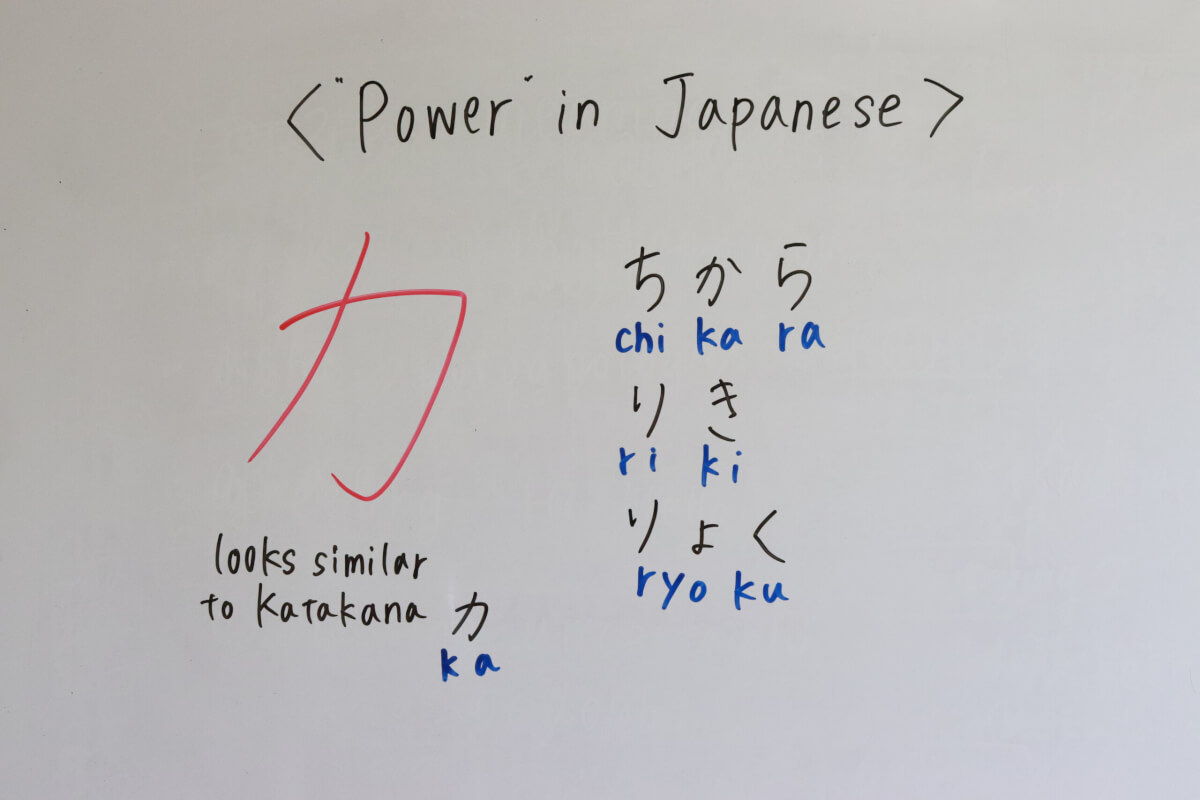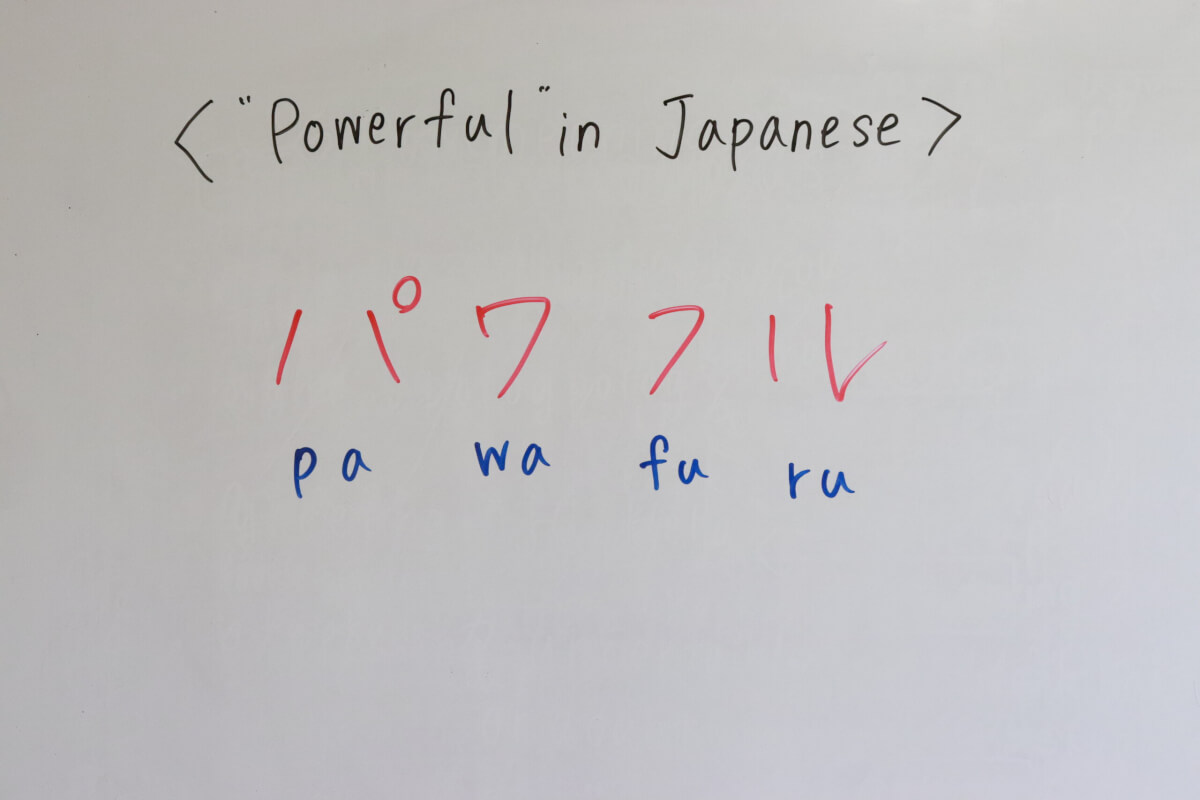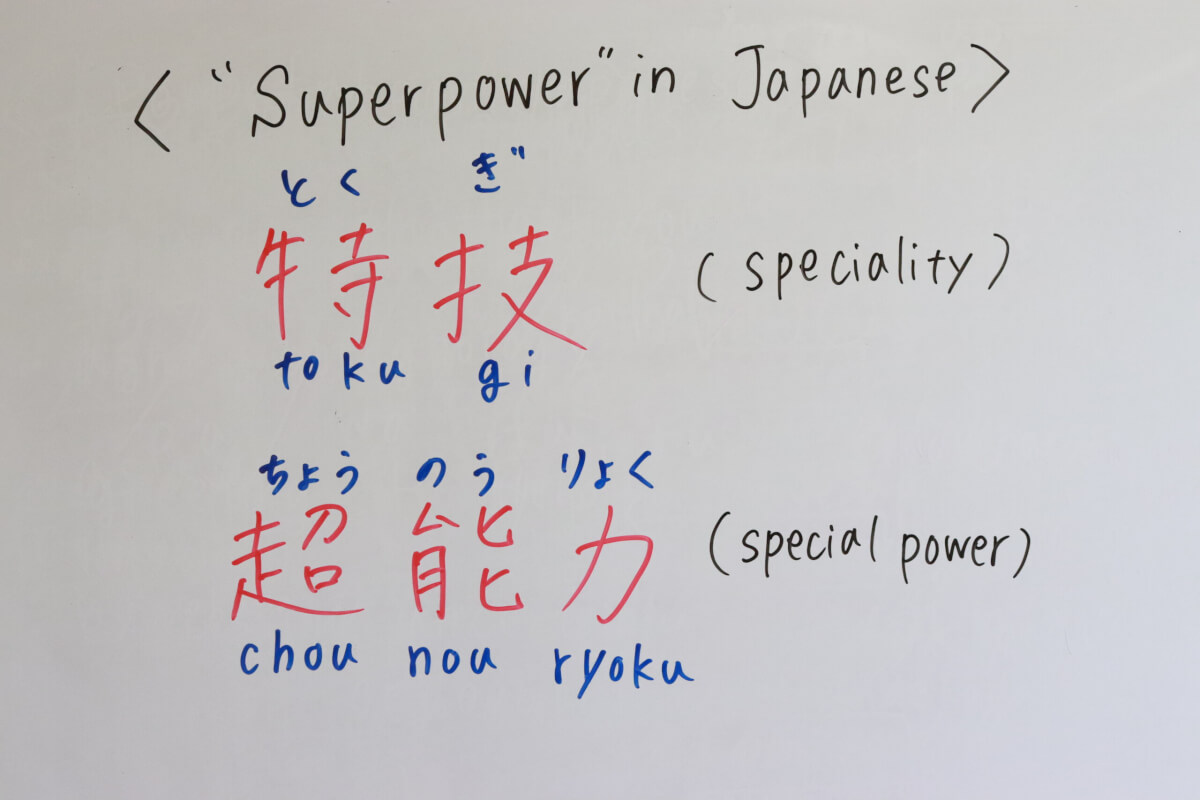- Release Date:
Japanese word for power ちから

It would be nice if we could study Japanese words every day. Today, let's learn how to say power in Japanese.
Power in Japanese word
Power in Japanese is "力(ちから、りき、りょく) /chikara, riki, ryoku/ ". It looks similar to Katakana "カ(か) ka" but it's another word.

My students often ask me how to distinguish between "Katakana カ /ka/" and Kanji "力 /chikara, riki, ryoku/", and Japanese people distinguish them by the words that follow.
For example, if the word that follows it is in Hiragana, it is most likely the Kanji "力 /chikara, riki, ryoku/".
ex)
彼(かれ)はとても力(ちから)が強(つよ)いです。
/kare wa totemo chikara ga tsuyoi desu/
He is very strong.
Or if the word that follows is in Katakana it is probably "Katakana カ /ka/".
ex)
カナダに行(い)きました。
/kanada ni ikimashita/
I went to Canada.
Powerful in Japanese word

In Japanese, powerful is パワフル /pawafuru/. It has similar pronunciation as English.
ex)
彼女(彼女)はパワフルです。
/kanojo wa pawafuru desu/
She is very powerful.
Superpower in Japanese word

Superpower in Japanese is translated as "特技(とくぎ) /tokugi/" or "超能力(ちょうのうりょく) /chounouryoku/". "超能力(ちょうのうりょく) /chounouryoku/" is more like a very special power. "特技(とくぎ) /tokugi/" is more like speciality.
ex)
もし、超能力(ちょうのうりょく)があったら何(なに)をしたい?
/moshi chounouryoku ga attara nani o shitai?/
If you had superpowers, what would you want to do?
私(わたし)の特技(とくぎ)は少(すく)ない食材(しょくざい)でなんでも作(つく)ることです。
/watashi no tokugi wa sukunai shokuzai de nandemo tsukuru koto desu/
My special skill is to make anything with a few ingredients.
Idioms using 力 /chikara, riki, ryoku/
As in other languages, there are many idioms using "power". There are examples.
- 力持ち(ちからもち /chikaramochi/) - Strong person
- 力不足(ちからぶそく /chikarabusoku/) - Lack of ability
- 全力(ぜんりょく /zenryoku/) - Full effort
- 体力(たいりょく /tairyoku/) - Physical strength
- 努力(どりょく /doryoku/) - Effort, hard work
- 権力(けんりょく /kenryoku/) - Power, authority
- 学力(がくりょく /gakuryoku/) - Academic ability
- 暴力(ぼうりょく /bouryoku/) - Violence
- 協力(きょうりょく /kyouryoku/) - Cooperation
- 能力(のうりょく /nouryoku/) - Ability, capability
- 実力(じつりょく /jitsuryoku/) - Real ability, skill
- 圧力(あつりょく /atsuryoku/) - Pressure
- 活力(かつりょく /katsuryoku/) - Vitality, energy
- 精神力(せいしんりょく /seishimryoku/) - Mental strength
- 引力(いんりょく /inryoku/) - Gravity, attraction
- 影響力(えいきょうりょく /eikyouryoku/) - Influence
- 魅力(みりょく /miryoku/) - Charm, appeal
- 突破力(とっぱりょく /topparyoku/) - Breakthrough power
- 決定力(けっていりょく /ketteiryoku/) - Decisive power
- 筋力(きんりょく /kinryoku/) - Muscle strength
- 攻撃力(こうげきりょく /kougekiryoku/) - Offensive power
- 防御力(ぼうぎょりょく /bougyoryoku/) - Defensive power
- 説得力(せっとくりょく /settokuryoku/) - Persuasiveness
- 行動力(こうどうりょく /koudouryoku/) - Ability to take action
- 集中力(しゅうちゅうりょく /shuuchuuryoku/) - Concentration ability
- 努力家(どりょくか /doryokuka/) - Hard worker
- 自力(じりき /jiriki/) - One's own strength
- 動力(どうりょく /douryoku/) - Power (mechanical or energy)
- 原動力(げんどうりょく /gendouryoku/) - Driving force
- 人力(じんりき) - Human power
